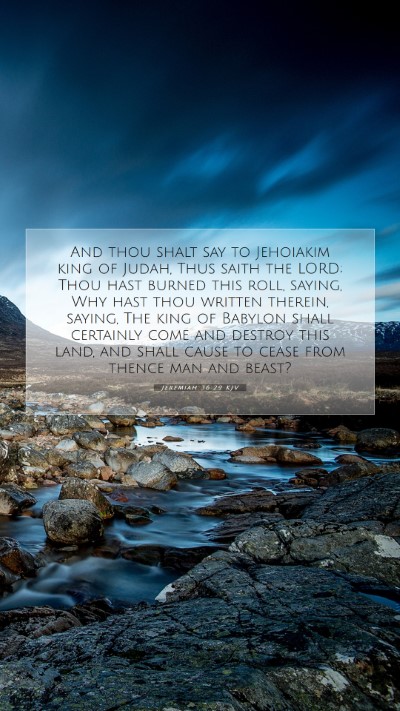Understanding Jeremiah 36:29
The verse Jeremiah 36:29 states:
"And concerning Jehoiakim king of Judah thou shalt say, Thus saith the Lord; Thou hast burned this roll, saying, Why hast thou written therein, saying, The king of Babylon shall certainly come and destroy this land, and shall cause to cease from thence man and beast?"
This verse is part of a larger narrative concerning the fall of Jerusalem and the judgment of God upon the people due to their disobedience. Below, we explore the meanings and interpretations of this significant verse as seen through the lens of various public domain commentaries.
Insights from Commentaries
Matthew Henry's Commentary
Matthew Henry emphasizes that this passage illustrates the stubbornness and rebellion of king Jehoiakim against God’s word. Jeremiah was instructed to deliver a message denouncing the king's act of burning God's prophecy. Henry points out that such actions demonstrate a resistance to divine truth and an attempt to silence God's warnings.
Albert Barnes' Notes
Albert Barnes provides further details, highlighting the significance of the scroll that Jehoiakim burnt. He notes that the king's refusal to heed the warnings against Babylon's impending invasion signifies a rejection of God's authority. Barnes stresses that this verse serves as a sobering reminder of the consequences of discarding divine messages.
Adam Clarke's Commentary
Adam Clarke adds context about the historical backdrop of the siege of Jerusalem. His commentary indicates Jehoiakim's fear and pride fueled his defiance. Clarke intricately relates how this act of burning the scroll ultimately leads to intensified judgment upon the nation. He underscores the profound implications of ignoring God’s prophetic words.
Contextual Understanding of Jeremiah 36:29
This verse finds its place in a critical moment of biblical history concerning God's communication through the prophet Jeremiah. The burning of the scroll symbolizes a broader rejection of God's revelations. Understanding this context helps in grasping the seriousness of the consequences that follow disobedience to God's word. The implications extend beyond just ancient Judah—this situation echoes throughout history and resonates even today regarding leaders who disregard prophetic warnings.
Significance in Scripture
Jeremiah 36:29 serves as a profound reminder of:
-
The Importance of Listening to God: Ignoring God’s messages can lead to dire consequences, impacting not only individuals but also entire nations.
-
The Role of Prophecy: This verse demonstrates the authority of prophetic words and how they are often met with resistance from worldly powers.
-
Historical Lessons: It provides insights into the reasons behind the Babylonian conquest and the plight of the Jewish people.
Application of Jeremiah 36:29 in Daily Life
For modern readers and Bible study groups, this verse encourages thoughtful self-reflection:
-
How do we respond to knowledge or truths we may find uncomfortable? Are there areas in our lives where we resist God’s guidance?
-
What can we learn about the authority of God’s word? This verse prompts believers to embrace God’s teachings, rather than reject them out of fear or pride.
-
Understanding the prophetic messages: It reminds us to respect the weight of biblical prophecy and apply its lessons in our contemporary contexts.
Cross References
Readers may find it useful to explore the following related scriptures for deeper insight:
- Jeremiah 1:17: God calls Jeremiah to speak His words boldly.
- Jeremiah 25:8-11: Prophecy of Babylon's domination.
- 2 Kings 24:1-4: The historical account of Jehoiakim's reign and its consequences.
Conclusion
Jeremiah 36:29 acts as a profound testament to the importance of adhering to God’s word and understanding the peril of disregarding divine messages. In the realm of Bible verse meanings and Bible verse explanations, this verse encapsulates the grave consequences of rejecting prophetic insight, serving as a call to wisdom in our own lives and leadership.


